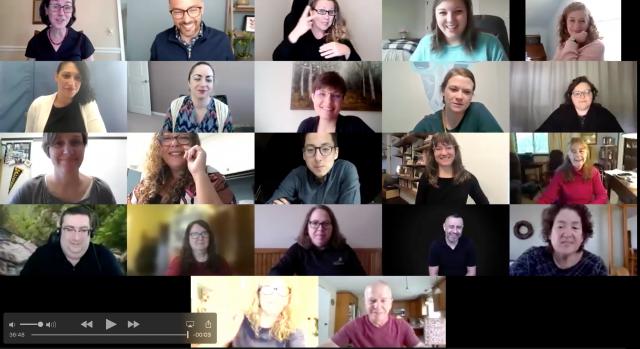Building relationships within your community takes time and intentional efforts. That’s why dialogue is key to building #DeafSuccess and a strong and inclusive community that serves all its members.
The National Deaf Center on Postsecondary Outcomes (NDC) has been facilitating community conversations, which included state leaders across the country, to help grassroots and local leaders strengthen community connections and build systemic change through dialogue.
Leaders from 15 states met online on April 22 as part of NDC’s Engage for Change | state initiative. They came together to learn about NDC’s community engagement efforts and connect with other state leaders on strategies to use dialogue in state work.
State Agencies Use Dialogue to Improve Services and Relationships
While state agencies provide much-needed services, they should continuously seek strategies to build deeper relationships with the deaf communities they serve, using dialogue as a tool. This ensures the decisions being made on the state agency level are in alignment with community needs and priorities.
State leaders described challenges related to agency leadership and staffing that may impede relationships with community members — for example, staffing turnover, lacking deaf representation, and limited staff with fluency in ASL.
They found that intentional recruitment strategies were needed to increase diverse representation in agency leadership and staffing. Hiring deaf staff was one way to help build relationships and ensure deaf people were represented at the table and included in decision making.
Additionally, hiring deaf staff who are members of marginalized communities was key. This truly embedded marginalized experiences and stories in the work of the agencies which helped ensure that they set priorities that responded to community needs.
Training and dialogue within the agencies themselves were important as well. State leaders shared that some agencies coordinated training for their staff related to social and racial justice, which helped strengthen their capacity to work with marginalized communities.
They also said that regularly scheduled, intentional interagency meetings appeared to be an effective strategy for strengthening collaboration and improving services for deaf people.
Barriers and Strategies for Engaging Communities
In most states, reaching out to deaf youth and deaf people in rural communities is a challenge. State leaders explained that virtual community engagement opportunities appeared to be a promising strategy for increasing outreach, particularly for these marginalized groups in remote locations.
Many of these remote communities, however, don’t have access to technology and high-speed internet. Some agencies approach this challenge by paying for equipment and access for deaf clients, which enables them to participate in virtual events and make sure their perspectives are included.
State leaders also mentioned that hosting events that target specific marginalized communities, such as deafblind people, and partnering with other organizations in this work can be successful. Agency staff can also build community relationships by participating in events hosted by other organizations.
Engagement and dialogue opportunities that were more transparent, like including community members in decision-making and following through or sharing information after events, helped create conditions for deaf community members to see how those decisions were made and build confidence in future dialogue.
An important point in facilitating this dialogue was to think about language accessibility as well, particularly in communities where multiple languages are used.
More Information
NDC recognizes the importance of using dialogue to guide decision making. Engage for Change | state teams will meet regionally in the coming weeks to continue sharing success strategies.
These resources and courses can help you in your journey of using dialogue as a tool to engage community members in decision making and representation, as well as to inform state level programs and activities.
Resources
Online Learning Courses









